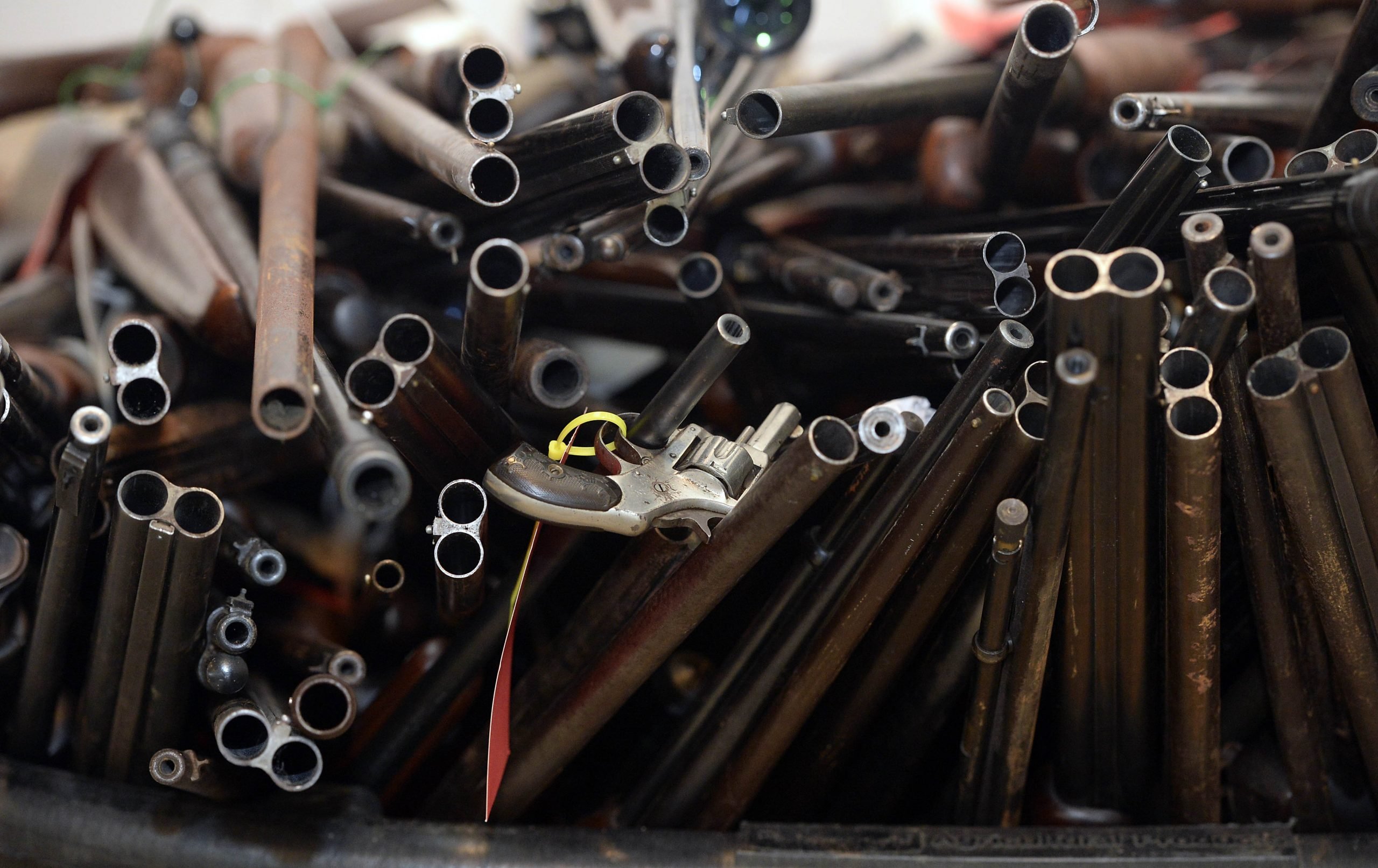In September 2016, DuWayne Gregory, a county legislator on Long Island, introduced a bill that he thought would reduce the number of gun thefts and accidental shootings in his community.
The measure sought to require gun owners in Suffolk County to store their firearms in a secure “depository” — like a safe — or to render their weapons incapable of being fired with a locking device whenever out of their “immediate possession or control.” Gun owners found in violation of the law would be subject to fines and possible jail time.
The law would have been, in Gregory’s words, a “reasonable” way to save lives. But some local gun owners revolted.
At a packed public hearing the following month, one person asserted that such a law would have forced President Franklin Delano Roosevelt, who reportedly slept with a gun under his pillow, to lock up his firearm whenever he left his bedroom. Another critic said there were already enough “ridiculous laws” in the United States.
“I’m an ex-military person,” Gregory said in an interview with The Trace. “Grew up in a household of guns. But they [the bill’s opponents] thought it was part of a Democratic antigun agenda to usurp the constitutional rights of gun owners.”
He withdrew the bill two months after its introduction.
Hundreds of thousands of guns are stolen every year in the United States. An investigation by The Trace and NBC-owned TV stations found that weapons are often stolen after being left on car seats, coffee tables, and other places where they are easy to grab. Many of those guns later turn up at crime scenes, including robberies and murders.
There is no federal law requiring that guns be stored securely. The only state with an comprehensive safe-storage law is Massachusetts. It requires gun owners to keep their firearms in a locked container or render them inoperable unless they are under their control or that of other “lawfully authorized” users. Three other states — California, Connecticut and New York — require guns to be locked up when not in use in certain situations, including when gun owners live with convicted felons or domestic abusers.
Several cities — including New York and San Francisco — have passed their own requirements on gun storage. But in wide swaths of the country, including in many blue states, gun owners have no obligation to lock away their firearms when not in use. Some states, instead, have enacted legislation that encourages behaviors that advocates and public health research show increases the risk of theft — including forcing businesses to allow employees to store guns in their vehicles while at work.
As with many areas of gun policy, the research on firearm storage laws is scant. But data from the Federal Bureau of Investigation show that the four states with some version of a safe-storage law experience rates of gun theft well below the national average. Safe-storage laws have also been linked to declines in unintentional gun injuries and suicides among young people.
A survey published this year by Harvard and Northeastern universities found that gun owners who stored firearms loaded or unlocked — or kept them in their vehicles — were more than twice as likely to have had their firearms stolen.
Experts said that it stands to reason that safe-storage laws would lead to lower rates of gun theft. “I think that’s just common sense,” said Philip J. Cook, a prominent gun violence researcher and Duke University professor.
Gregory’s experience in Suffolk County speaks to the frustrations that Democratic lawmakers and advocates of gun violence prevention have encountered in trying to pass laws aimed at keeping guns out of the hands of children and thieves. Even more modest proposals — like an effort in Texas to earmark money for a safe-storage education program — have foundered.
Kym Worthy, the chief prosecutor in Detroit, has been advocating stricter storage laws in Michigan. But the bills never advance, she said. “It has been very difficult with the Michigan Legislature,” Worthy said. The bills “never make it out of committee.”
In Florida, State Senator Gary Farmer Jr., a Democrat from Fort Lauderdale, introduced a bill last year to plug what he said was a “gaping loophole” that stopped prosecutors from filing charges against gun owners who left firearms around children. The bill was referred to the Judiciary Committee, chaired by Senator Greg Steube, a Republican from Sarasota and a staunch ally of the National Rifle Association.
“The bill died in a drawer without the benefit of a public hearing,” Farmer said. He introduced the bill again this year, and is bracing for the same result.
Farmer’s proposal would have enacted what advocates of gun violence prevention call a Child Access Prevention, or CAP, law, intended to guard against children killing or injuring themselves with unattended guns. At least 27 states have passed a version of a CAP law, according to the Giffords Law Center to Prevent Gun Violence. Most CAP laws impose criminal penalties for negligently storing firearms where minors could or do gain access to them, or knowingly providing guns to children.
Safe-storage laws go further than CAP laws, requiring guns to be locked up when owners are not carrying them or do not have them in close proximity, regardless of whether a minor is present.
Gun violence prevention advocates say the distinction matters. “Burglaries are commonplace in the United States, and criminals will take whatever high-value commodity they can get their hands on, and an unsecured, loaded firearm is a high-value commodity,” said Allison Anderman, managing attorney for the Giffords Law Center to Prevent Gun Violence. “So requiring that these lethal weapons not be accessible to criminals is important.”
Two of the chief arguments among opponents to safe-storage laws is that they interfere with their right to defend themselves and penalize otherwise law-abiding gun owners after they become the victim of a theft. In a public hearing for the storage law proposed by Gregory, the Suffolk County legislator, a man who said he was an NRA training counselor offered what he believed was a plausible scenario if a robber broke into his home: “Excuse me, wait a minute, let me get my gun to get the means to resist you,” he said, according to a transcript.
“No, that doesn’t really work very well,” the man added. “That’s when they come and draw a chalk outline and write a report.”
Jim Wallace, executive director of the Gun Owners Action League, a gun-rights group in Massachusetts, told The Trace that his state’s storage laws have engendered confusion, causing gun owners to inadvertently run afoul of the rules. In Massachusetts, licensed gun owners don’t have to lock up their handguns while transporting them in their cars as long as the weapon is under their direct control. But if they, say, stop for a cup of coffee, that constitutes storing, and the gun has to be locked up.
Wallace said the government should focus on educating gun owners about safe storage. “How about before we start mandating things by law and removing people’s rights, we actually try the educational route?” he said. “But Massachusetts never wants to do that. That’s one of the things we really hate.”
Suffolk County, Massachusetts, which includes Boston, has charged 70 adults and four juveniles with improper storage of a firearm over the last three years, according to the district attorney’s office. In one case, a gun owner with a license to carry for target and hunting purposes pulled a firearm out of his car to threaten another driver — who happened to be an off-duty police officer. In another, police officers were arresting a suspect at his apartment when they discovered a stolen gun stashed in a suitcase in his kitchen.
But Anderman said the safe-storage laws now on the books contain an important distinction: They allow gun owners to carry weapons inside their homes or keep them close by, requiring locks only when they leave their firearms unattended. Advocates also say that technology has advanced to such a degree that locks and safes can be opened with speed and ease.
In Denver, Ricky Lee Denny’s Jeep Grand Cherokee was stolen from in front of his house — along with the .380-caliber pistol he had left inside — in 2015. Later, his grandson moved in with him, so Denny, a self-described gun collector, started locking his firearms in safes and lockboxes, and storing his ammunition in a separate locked cabinet, he said. To protect himself, he keeps a gun in a lockbox next to his bed.
Asked if he worried about accessing his gun during an emergency, Denny said no. “I can reach over and go 1-2-3,” he said, extending his arm as he pretended to press buttons on a keypad, “and it pops open.”
A 2008 Supreme Court decision appears to have raised questions about whether safe-storage laws are constitutional. In District of Columbia v. Heller, the court overturned the District’s requirement that guns in the home be stored disassembled or locked, saying that the rule made “it impossible for citizens to use arms for the core lawful purpose of self-defense.”
San Jose, California, joined the list of cities with a safe-storage law this month, when a measure took effect requiring gun owners to secure their weapons whenever they leave their homes.
“I felt that one step everyone should agree on is that we should reduce the number of firearms that are being stolen,” said Ash Kalra, one of the San Jose city councilmen who introduced the measure. (Kalra has since left the City Council to join the state Assembly).
“The idea behind this law isn’t to punish people, but to keep them safe,” Kalra said. “Great to see it’s starting to sink in that we have a major problem.”
Max Siegelbaum contributed reporting for this article.


